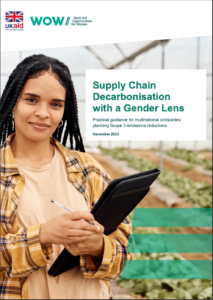
The urgency of the climate crisis means that a growing number of companies are investing resources to better understand and reduce emissions across their supply chains, including indirect or Scope 3 emissions. Frameworks – such as the GHG Protocol Corporate Value Chain (Scope 3) Standard – have been developed to help support this process; however, to date the proposed approaches have devoted little attention to the role of, and impacts of interventions on, people in those supply chains. This is especially pertinent in the case of women who are often disproportionately vulnerable to climate impacts.
The FCDO’s Work and Opportunities for Women Programme has, in consultation with companies including Flamingo, The John Lewis Partnership and Avon, produced some new practical guidance. The aim of this guidance is to ensure that women are both unharmed by decarbonisation strategies, and that their participation in any benefits generated in the process is secured. It is particularly relevant to businesses in sectors that rely on significant numbers of women in their supply chains (for example, agriculture and clothing).
This guidance also aims to help companies to prepare for forthcoming regulatory proposals which will increasingly require enhanced reporting on human rights and environmental impacts, including Scope 3 emissions. Such proposals include the EU’s Corporate Sustainability Reporting Directive (CSRD) as well as recommendations in the US to enhance corporate climate disclosures, which could include making Scope 3 emissions reporting mandatory.
The guidance describes a four stage process for undertaking decarbonisation with a gender lens – including setting a strategy and heatmapping where emissions and risks to women workers are both high. It then offers a series of suggestions on actions to decarbonise with a gender lens (including a detailed look at incentivising suppliers, procurement choices that include sourcing from women workers, new products and services including regenerative farming and new business models including a focus on women’s role in recycling and waste). Finally, the guidance also covers how to consider appropriate carbon removal projects and insetting.










